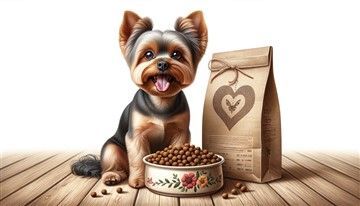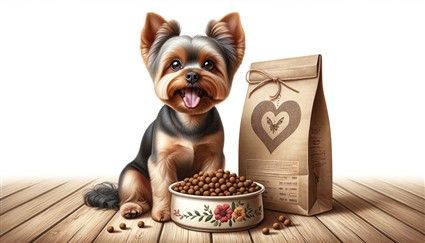Yorkshire Terrier Feeding Guidelines
Overview
Please note: YorkieInfoCenter is reader-supported, and some of the product suggestions on this page are affiliate links. As an Amazon Associate we earn from qualifying purchases. This is at no extra cost to you and helps us continue providing free, high-quality information.
This article is the main food page and covers all elements regarding meals.
If you are looking for information regarding training treats, snacks, chews or advice for food-related behaviors, see 'Related Articles' below.
Don't need all the details and just want to see recommendations? Jump to 'Choosing the Best Food for a Yorkshire Terrier'.
How Often to Feed a Yorkshire Terrier
Quick Breakdown:
- Puppies up to 3 months old (or at least 2.5 lbs.): Free-feed.
- Puppies 3 months to 1 year old: 3 to 4 meals per day plus small snacks.
- Adults 1 year and older: 2 to 3 meals per day plus small snacks.
Details:
The feeding schedule for Yorkshire Terriers is different than that for larger breeds, as they need to be fed small, frequent meals. While other breeds may do okay with just one main meal, going for such long times in between feedings can cause problems that range from low blood sugar (also known as hypoglycemia; signs include weakness and clumsiness) to stomach upset (which may include vomiting up yellow/white foam). With hypoglycemia, immediate treatment should be given which includes rubbing a dab of honey onto the gums and calling the vet for assistance.
For this reason, the following feeding schedule is recommended:
New puppies, up to 3 months old or at least 2.5 lbs.:
3 months old (or 2.5+ lbs.) to 1 year old:
1 year and older:
Much to Feed a Yorkshire Terrier
Before discussing serving sizes, it's important to note that foods vary in calorie density. The amount a Yorkie eats will differ based on whether the food is wet or dry and its specific ingredients. Serving sizes are guidelines; the actual food a Yorkie needs depends on its activity level, age, health, and metabolism. Weather changes can also impact dietary needs. Typically, puppies need about 55 calories per pound of body weight, adults need 40 calories, and seniors may need 35-38 calories if less active. However, precise calorie counting isn't necessary.
Dry Kibble vs Wet Dog Food: Which is Better for Yorkshire Terriers
Dry kibble is recommended for most Yorkshire Terriers, but there are a couple of exceptions.
Dry kibble is best for oral health which is important for small breeds like the Yorkshire Terrier that is prone to dental issues. It also tends to be more convenient, economically efficient and can be left out longer without spoiling, making it a good choice for Yorkies with busy pet parents.
Wet dog food, on the other hand, may be more palatable and easier to eat for some Yorkies, especially seniors or those with dental problems or tooth loss. Note that it is generally more expensive and needs to be consumed more quickly once opened.
How to Make Dry Kibble More Appealing
Grains vs Grain-free Dog Food
- 4Health (32 reports)
- Acana (67 reports)
- Blue Buffalo (31 reports)
- California Natural (15 reports)
- Earthborn Holistic (32 reports)
- Fromm (24 reports)
- Merrick (16 reports)
- Natural Balance (15 reports)
- Nature’s Domain (29 reports)
- Nature’s Variety (10 reports)
- Nutrisource (10 reports)
- Nutro (10 reports)
- Orijen (12 reports)
- Rachael Ray Nutrish (10 reports)
- Taste of the Wild (53 reports)
- Zignature (64 reports)
- A 6-year-old male Yorkshire Terrier that was eating Zignature Kangaroo kibble
- An 8-year old female Yorkshire Terrier that was eating Zignature Kangaroo canned food
- A 1-year-old male Yorkie mix that was eating Castor & Polloux freeze-dried nuggets
- A 9-year-old female Yorkshire Terrier that was eating Acana Light & Fit and Acana Small Breed Adult
- The Yorkshire Terrier is not a breed that is prone to DCM; the list does include the Afghan Hound, American Cocker Spaniel, Boxer, Dalmatian, and mainly larger dog breeds.
- However, seeing as there were few reported cases of DCM with Yorkies, adding in some healthy whole grains should be considered.
- If you believe that your Yorkie is allergic to grains, it may actually be a matter of a gluten sensitivity. Wheat contains very high levels of gluten and if that is kept out of the diet, your Yorkie may do very well with grains that are gluten-free such as rice (brown or white), oatmeal, and quinoa (technically a seed). Barley, though it does have some gluten, tends to also be very well tolerated.
- If you opt for grain-free, choose a recipe with traditional proteins (to avoid exotic meats). Options include chicken, turkey, beef, duck, lamb, or fish.
Puppy to Adult to Senior Dog Food: When to Make the Switch
For Yorkshire Terriers, a toy breed known for their vivacious personality and compact size, the transition through life stages from puppyhood to adulthood and then to seniority requires specific dietary considerations.
Yorkshire Terrier puppies should be fed a high-quality puppy formula that is nutrient-dense to support their rapid growth phase until they reach adulthood, typically around 12 months of age. This ensures they receive the proper balance of nutrients necessary for optimal development, including proteins, fats, and essential vitamins and minerals.
Once a Yorkshire Terrier matures into an adult around the one-year mark, transitioning to an adult dog food formulated for small breeds is crucial. Adult formulas provide the necessary nutrients to maintain their health, energy, and coat quality without extra calories, as growth is complete. Given their size, adult Yorkies benefit from food that continues to have smaller kibble sizes for easier chewing and digestion.
For senior Yorkshire Terriers around the 8-year mark, the need to switch to a senior diet depends somewhat on dietary supplementation. If their diet includes omega fatty acids (for skin, coat, and joint health) and glucosamine HCL and chondroitin (for joint health and mobility), a senior formula may not be necessary. If these supplements aren't part of your Yorkie's diet, a senior-specific formula is usually recommended. In addition, senior dog foods are often designed with adjusted calories to prevent weight gain (not usually an issue for this breed, but sometimes seen with seniors).
Choosing the Best Food for a Yorkshire Terrier
What to Avoid:
- Chemical preservatives. These can cause allergic reactions (itching, hot spots, skin rash) and/or intestinal distress and some are known carcinogens.
- Artificial coloring or flavoring. These additives can also cause mild to severe allergic reactions and certain dyes (Blue #2, Red #40, Yellow #5 and #6, 4-MIE) are also linked to behavioral issues (hyperactivity and anxiety), and some forms of cancer.
- Fillers. These are inexpensive ingredients loaded into food to plump it up but offers little to no nutritional value. Ingestion of fillers can cause nutritional deficiencies and intestinal distress and is one cause of coprophagia (eating feces).
- By-products. Added as a cost-saving method to reach protein quotas, this may include lungs, intestines, brain, and other meats or tissue not fit for human consumption.
- Generic meats or oils. This can legally be roadkill and meat from diseased animals.
- Made in China. Pet foods with ingredients sourced from China are responsible for thousands of deaths.
What to Look For:
Steering clear of the above, your Yorkie's food should have:
- Natural preservatives. Dog food can be successfully preserved using a vitamin blend (usually listed as mixed tocopherols) and/or certain herbs or plant extracts including rosemary and spearmint.
- No artificial coloring or flavoring.
- Wholesome traditional meats (this may include whole or meal (compressed) chicken, turkey, goose, duck, rabbit, lamb, beef, or a variety of fish including whitefish and salmon).
- Fruits and vegetables.
- Omega-3 fatty acids. While one source is flaxseed, the best source is fish oil. This is important for joint health.
- Small-sized kibble. To facilitate comfortable eating.
- Made in the USA or Canada. In addition, ingredients sources from New Zealand are considered very safe.
Recommendations:
Please note: For puppies (under 1 year old) and seniors (age 8 and up), Wellness makes formulas for these ages, via their Wellness Complete Health Small Breed Puppy Formula and Senior Formula, which can be reached via the adult recipe above.
This 100% all-natural kibble has a base of chicken and turkey with brown rice and oatmeal. It also has salmon, flaxseed and the wide array of vitamins and minerals expected in a quality brand. It has excellent levels of glucosamine and chondroitin for joint health, as well as omega 3 and 6 for skin and coat health. This is made in the USA (this company started in Texas) and this is sized nicely for small dogs.
Designed for energetic small dogs, this is also 100% all-natural with a base of chicken, turkey, sweet potato (great for sensitive tummies), potatoes, peas, and white fish. It also has good levels of probiotics (for good digestion), glucosamine and chondroitin (for joint health) and omega 3 and 6 (for healthy skin and coat). Merrick is made in the USA.
Home Cooking
- Protein - White chicken meat or turkey (de-boned, no skin, baked or broiled), lean beef, fish (mackerel, whitefish, salmon, herring, walleye, flounder, haddock, cod), lamb, veal, bison, chicken livers, and/or pork (should not be the main protein source, but can be blended into meals). Other protein sources include eggs and beans such as lima beans, kidney beans, and butter beans (must be cooked).
- Vegetables - Includes peas, sugar snap peas, carrots, spinach, potato, sweet potato, zucchini, green beans, bell peppers, string beans, kale, and butternut squash.
- Grains- If you wish to include grains, this can consist of rice (white or brown), pasta, quinoa, oats, oatmeal, and/or pearled barley.
- Fruits - Includes blueberries, raspberries, strawberries, huckleberries, banana, cantaloupe, honeydew melon, mango, kiwi, pear, peaches (no pit), plums (no pit), nectarines (no pit), fresh pineapple, and apple (no core, no seeds).
- Extras - Includes whole white yogurt, cottage cheese, certain shredded hard cheeses, and eggs (with or without the shell ground to a fine sand)
Best Treats for a Yorkie with a Sensitive Stomach – If your Yorkshire Terrier has a tummy that’s quick to rumble, finding the right treat can feel like a guessing game. Thankfully, there are some fantastic, gentle goodies that deliver lip-smacking flavor.
Yorkshire Terrier Picky Eating - If your little guy or gal has you rushing around trying to find a food they'll like and stick with and they seem to have revolving taste buds, this article will help get things back on track.




